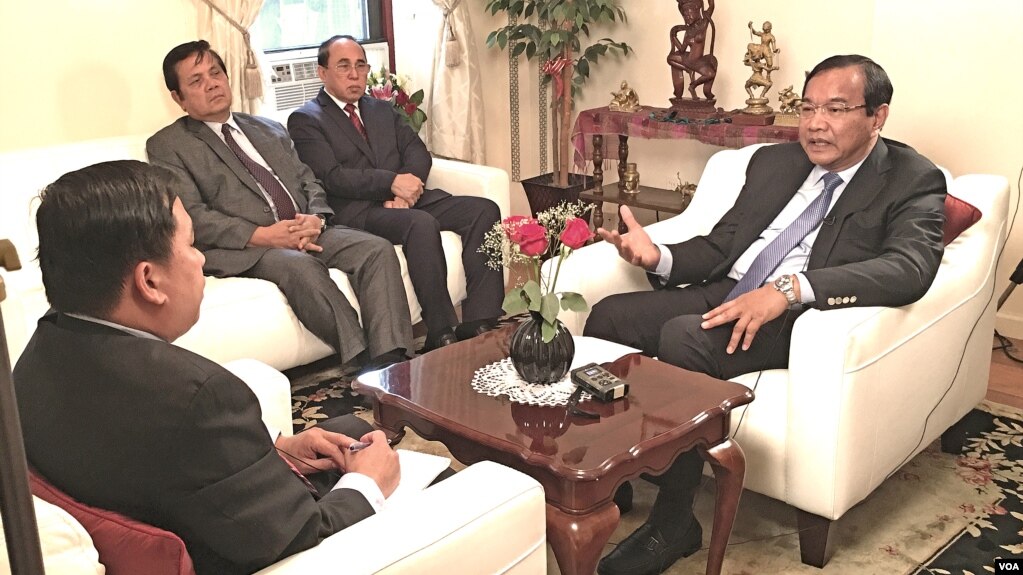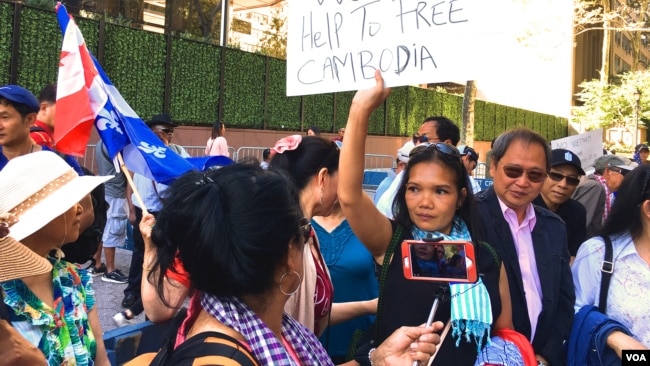 |
| Prak Sokhon, a foreign minister, provides an exclusive interview to VOA Khmer, during his trip to attend the United Nations General Assembly in New York City, Saturday, September 23, 2017. (Poch Reasey/VOA Khmer) |
Exclusive: Cambodia FM Softens Tone After Scathing Attack on ‘Hypocritical’ West
VOA | 29 September 2017
In the interview with VOA Khmer following the General Assembly meeting, Prak Sokhon railed against the “one-sided” presentation of recent events in Cambodia in the media.
NEW YORK —
Cambodia’s foreign minister last week launched a scathing attack on Western democracies, labeling them hypocritical and only interested in promoting human rights and democracy when it was in their own self-interest.
Prak Sokhon, a foreign minister, told the U.N. General Assembly’s 72nd Session on September 22 that human rights and democracy issues were only raised “when the specific interests of certain major powers are at stake.”
The comments came amid a surge in anti-American rhetoric from the government of Prime Minister Hun Sen, which has jailed the leader of the country’s opposition on allegations he conspired with the United States to unseat the long-term premier.
But in an exclusive interview with VOA Khmer this week he softened his tone, saying Cambodia wanted relations to improve, but continuing criticism of the international media’s portrayal of the crackdown on dissent in Cambodia.
In the interview with VOA Khmer following the General Assembly meeting, Sokhon railed against the “one-sided” presentation of recent events in Cambodia in the media.
He said that the closure of the National Democratic Institute in Cambodia, the American-owned Cambodia Daily newspaper, and numerous radio stations broadcasting U.S.-funded radio programs, were “being done in accordance with the law.”
The government has come under heavy criticism from Washington and its allies, while China has lent Phnom Penh explicit support for its crackdown on dissent.
As Sokhon was giving his speech at the General Assembly last week, Cambodian-American protesters gathered at the U.N. Headquarters to oppose the government line.
Steven Reach, a New York City resident, said he was unhappy with the “unreasonable” charges against Sokha. “This is the kind of politics that make Cambodians hopeless and unable to register for the election,” he said, adding that he hoped the U.N. could exert some influence over Hun Sen’s government.
Annie Van, another Cambodian-American, from Massachusetts, said: “I and my colleagues came here to ask Prime Minister Hun Sen to free Kem Sokha, who is Cambodia National Rescue Party leader, as well as free the other political prisoners of the opposition party.”
Sokhon has held a series of meetings with his counterparts since arriving in New York for the General Assembly session. He ended his speech to the General Assembly by criticizing what he said was the hypocrisy of the international community.
“I will conclude by saying that the discourse of certain governments on human rights and democracy will be relevant and credible only when these countries choose to subject themselves first to the same standards as others when it comes to their own assessments, criticisms, and condemnation,” he said.
In the interview with VOA Khmer, Sokhon said Cambodia’s pivot towards China and away from the West was “for the benefit of the Cambodian people ... only because the relationship with China is based on mutual respect and mutual benefit.”
“We have received Chinese aid, Chinese co-operation, Chinese investment,” he added, pointing to China’s huge investment in key economic sectors, such as hydropower.
“The relationship is considered in the interest of Cambodia, but it does not mean that Cambodia has become a satellite state of China,” he said. Cambodia, Sokhon insists, wants to “normalize relations” with the United States “at least back to the original level”.
Cambodia had proved its independence during the recent diplomatic tensions with North Korea, he added, as Phnom Penh has rejected overtures from Pyongyang to comply with U.N. resolutions.
Cambodia has historically held a close relationship with North Korea, which it has repeatedly attempted to use as leverage in its bid to act as a mediator in de-escalation talks. However, following recent missile tests Cambodia has publicly taken a stronger line against Pyongyang.
“Although Cambodia has a good and special relationship with North Korea, Cambodia issued two separate statements last year and two more statements this year regarding the missile launches an underground nuclear test. So we had clearly stated to North Korea that if you want to maintain the friendship, you need to comply with the UN Security Council and comply with the resolution of the UN member states,” Sokhon told VOA Khmer.
“We ask [all parties] to consider the proposal of China and Russia—the ‘double free’ proposal—that both sides halt the nuclear program of North Korea and halt the exercise or reduce the exercise to the acceptable level because the exercise is a spark of fire and that irritates North Korea,” he added, referring to recent U.S. military exercises in the region.



No comments:
Post a Comment